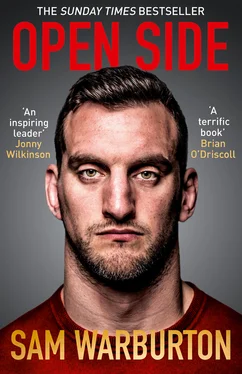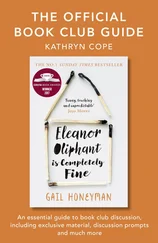And tackling, as the coach on the sidelines saw, is very much my thing.
The one constant through changing teams and changing years: Ben. On that grass verge near our house or on a pitch a few minutes away, we’re always playing; not just football now, but rugby and cricket too. God knows how much we cost Mum and Dad in broken windows, though of course we don’t really realise that things cost money.
The other thing we don’t realise is how much time we’re putting in to making ourselves better, because it never seems like a chore. In years to come Malcolm Gladwell will write in his book Outliers that it takes 10,000 hours to really master something, and Ben and I are putting in a lot of these hours without even realising it.
We do lots of one on ones, trying to beat each other. Ben’s where I get my competitive edge from. But no matter how much we want to beat each other, we always help each other along too. We make suggestions and point out where we think the other one’s going wrong. We work together and look out for each other. We don’t lay into each other or put each other down. We’re best mates.
2001. I’m still playing football, not just for Whitchurch – such a relief to watch Gareth tormenting other defenders week in, week out, shielding the ball from three players at once and then weaving through them like a magician – but also for Lisvane. It’s quite an affluent area of Cardiff, and a lot of the teams we play against take the mickey out of us for being posh lads and that. But we’re good – we go a couple of years undefeated – and we can look after ourselves.
When we play Grangetown, which is a rough and tough area, I’m determined to show we’re not going to let ourselves be intimidated. I come in hard on this kid, and he jumps on my back and tries to punch me. I hold his arms out like a crucifix and walk him all the way over to the ref so he can deal with him.
‘You ever come past JD Sports,’ this kid says afterwards, ‘we’ll be waiting.’
I know that he and his mates hang around there, and that a handful of them against one of me is going to be a different story. I give JD Sports a miss for the next couple of months.
Besides, I’ve slightly tarnished Lisvane’s reputation. Before I started playing for them, they prided themselves on a spotless disciplinary record. The first season I’m there, I get two red cards and three yellows. I’m being physical rather than dirty, but it doesn’t matter.
I realise that football doesn’t have enough aggro for me. Football’s a contact sport, but rugby’s a collision sport. I need to smash people when I play.
2002. We’re playing Llanhari. Their number 8’s a big lad, running to fat, and he’s nasty too. We’re not yet a quarter of the way through the match when I see him choking our scrum-half: proper choking, lifting him off his feet while holding him by the neck, all that.
I see red. I smash into this lad as hard as I can, picking him up and throwing him down head first. I don’t know how dangerous this is, of course; none of us do. I’m just enraged that he’s picking on one of my team-mates, and the smallest lad on the pitch to boot. Besides, dump tackling’s my trademark, my way of stamping my authority on the game and getting my team behind me. In each game I play, I don’t look to dump the smallest guy on their team, but the biggest one.
Having seen red once, I see it again when the ref sends me off. I can’t complain, but equally I won’t apologise. I’m not a dirty player, and I never do anything illegal unless provoked; but if someone starts something, I’m determined to be the one to finish it. And I’ll never back down from defending a team-mate. Even a chopsing scrum-half, talking back to people.
I’m waiting for the bell to start school when I first see him. He’s walking across the yard with a file in his hand, and it’s the way he’s walking which really catches my eye: upright, purposeful, military. Even before we’ve exchanged a word, I know this is not a man who’s going to settle for second best.
He’s called Gwyn Morris, and he’s our new PE teacher.
The hardest-working player will win, that’s what he tells us. If you work harder than your opposition, you will win. Twice a week he has us training for an hour before school and an hour afterwards. It’s not all physical stuff – we’re 14 years old, and you can’t push growing bodies too hard – but tactical and mental too. Mr Morris doesn’t just want us to work hard, but also work smart.
Be professional, he says. Professional isn’t about getting paid. It’s about the way you approach things and the standards you set. It’s about never being satisfied with your performance and always wanting to analyse your game, to see what you could do better next time round.
April 2003. We win the Welsh Schools championship. The final is at the Millennium Stadium, where only a few weeks earlier Wales were playing Six Nations matches against England and Ireland. (They lost both of those, and their three away matches too, for a whitewash and a wooden spoon.)
The stadium’s almost empty, but it doesn’t matter. Ben and I become the first twins to play at the Millennium (he plays in the centre), and I score two tries. It’s a great team full of great lads. Afterwards, on the bus back to school, I have a profound sense of satisfaction: a glow, really. We did it. We worked hard for it, and we worked smart for it, and we did it.
We’re singing and laughing and joking, and we feel like kings of the world.
I go for a trial at Cardiff City FC. Very quickly, I realise two things. First, there’s no one here who’s remotely as good as Gareth. It’s hard to know quite how good someone is when you only have the schools you play by way of comparison, but Cardiff are a decent club – they’ll get promotion to Division One, a step down from the Premier League, next season – so if Gareth’s better than all these kids then he really must be something special.
And second, I’m not good enough. This is a step too far for me. I’m a little sad, because football’s been my first love for as long as I can remember, but sooner or later I’d have to choose between football and rugby. This has made my decision for me, and deep down it’s probably the decision I wanted to make anyway.
October. For our 15th birthday, Mum and Dad give Ben and me a multigym, which we put in the garage. We train there after school.
I keep thinking of what Mr Morris said. Whoever works hardest will win.
I go to the school gym at lunchtime to do weights. Sad Lad, a couple of girls call me when they see me coming out dripping with sweat. I don’t care. I’m not too cool to make it look like it’s all beneath me. Gym, weights, speed stuff, I’m mad for it all. I drop honey sandwiches for tins of tuna, crisps for pieces of fruit.
Whoever works hardest will win.
December. We get 21 days’ holiday over Christmas, and I train at the school on 20 of those days. The 21st is Christmas Day, and the only reason I don’t train then is that the place is locked and I can’t get in.
Whoever works hardest will win.
2004. I start to train my mind as well as my body.
Whenever we play a match, I have to be better than my opposite number. You hear whispers on the circuit: oh, Pembrokeshire have got a good number 7, or Llanelli, or Pontypridd. And I’m thinking, Well, he can’t be as good as me. He can’t be as good an athlete as me, or train as hard as me, or want it as much as I do. So no matter how good he thinks he is, I’m better.
Whoever I play for, there’s only one number 7 shirt. I’m the best 7 at Whitchurch, which is a huge school. I’m better than everyone I play against, every 7 in all 26 of Cardiff’s secondary schools, and all across Wales. I’m the best 7 in Wales.
Читать дальше












